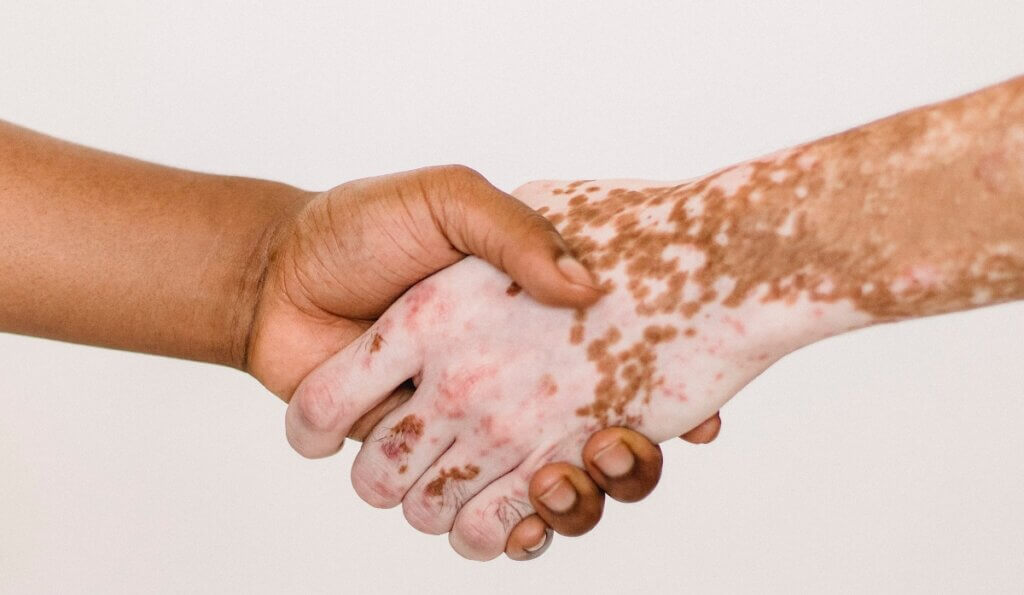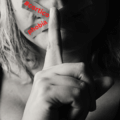Imagine you’re a guest at a friend’s wedding and the bride asks you to go home and cover your skin because she doesn’t want other guests having to ask about and being put off their food. What would you do?
I’ve just read an article, “Woman leaves friend’s wedding after being called out for not covering her skin.” and it’s sparked a whole debate in a whatsapp group I’m in. Thanks Olivia for sharing the article.

Asked to cover up your psoriasis by the bride
To cut a long story short, a guest at her friend’s wedding was asked to go home and cover up or conceal her visible skin condition, in this case psoriasis. Quite rightly the woman’s partner pointed out that if they were not welcome they would leave. The guest had been trying to find makeup and concealer that would work but it has only made her skin itchy, causing her to scratch and make it even worse.
Matters got worse when the bride then proceeded to complain about the friend having to leave after her wedding as it had really upset her and ruined her day.
Is there ever an excuse to ask someone to cover themselves?
This article made me really cross. How dare the bride do that? If it were me it would make me question the friendship and I’m not sure I would want to be around someone with so little empathy, sympathy or resilience.
But it got us thinking, my friends and I… where is a comment like this coming from and why is it made in the first place?
The biological inbuilt fear of discomfort
Sasha brought up evolution, and how we all have an in-built fear of the unknown, discomfort and pain. In the animal kingdom they will shun an injured comrade and even sometimes kill it. I’ve seen crows peck and attack and eventually kill another crow that couldn’t fly any more.
Surely humans have evolved way past the caveman instinct to keep away from people who might be sick and pass on disease.
It’s like clearing the streets of homeless people so you no longer feel uncomfortable seeing them.
It’s the old thinking that had children born with disabilities put into care homes because god forbid someone found out or saw you with a disabled child.
We have moved on from that. We are more civilised nation on the whole. But can we use this argument to understand perhaps why the bride reacted in the way she did?
Only wanting shiny beautiful people at her wedding day.
What is this obsession with perfection and a flawless complexion?
Just a quick scroll of Instagram, the TV, or a glossy magazine will show you just how obsessed we are as a nation with appearance, beauty, perfection and flawless ageless skin.
We need to change our way of thinking, to embrace difference and show compassion and empathy for people with facial and body differences. What is someone was born with a defect that means their face is a different shape? Or they have a skin condition like eczema, psoriasis or vitiligo? Actually, anyone who is disabled, guys it’s a lot to live with. The level of personal questions we get, or discrimination is unbelievable.
You have no right to anyone’s personal medical diagnosis
If you look at people and think… why are they in a wheelchair? What is wrong with their skin? How did they get born with such a deformity? Then this next part is for you. And sadly ladies it’s mostly the female’s of the species who ask these kinds of questions. To men we just become invisible. Ignored by half the population and just pitied by the rest. I mean things like this:
- What on earth happened to your skin? Don’t you moisturise?
- Why are you in a wheelchair?
- Were you born like that? and what is your condition called?
- Why don’t you wear makeup to cover up your skin?
- I wouldn’t be able to leave the house looking like that
- You’re so brave going out like that
- What’s wrong with your baby’s skin? You need to get some steroids on that! The amount of judgement eczema mums get it insane. Please don’t do it. Unless someone asks you for advice, the don’t want it!
- Can you please cover up your skin while at my wedding? Really takes the biscuit that one
- And if I ever say something like… “I’m so itchy at the moment and my skin is really sore.” one of my least favourite comments, which probably seems like a nice one is… “Oh your skin looks fine, I can’t even notice anything.” It’s so dismissing and gaslighty… I am in pain and I just opened up to you and you just waved it off…
Have you ever asked anything like the above?
These snowflakes, what on earth can you say?
I’ve been called a snowflake too which is nice (NOT). I’m not saying no one can ever ask me a question. Kids can ask me whatever they like because they are learning and genuinely might not have seen eczema before. To kids I explain I have a skin condition but that’s it not catching, it’s called eczema and I don’t use any topical steroids on my skin because long term has been very damaging. Usually they just nod and say, huh. OK. Some of them ask if it hurts, so I’ll explain how itchy and sore it can be. I love how kids just take in information like a sponge.
Most days I’ll respond politely to adults too, explain the situation and move the conversation on. But when it happens all the time it’s really hard sometimes. If you’re scared thinking, god what can I say that isn’t going to upset the person? You are not alone. Here’s few things to consider:
- Take a few seconds before speaking and start a conversation that isn’t based on appearance. People just want to be normal and might have spent hours getting ready to face the world.
- Compliment them on something – instead of pointing out their red skin, lack of makeup, or flakes… find something nice to say. Like, “I love your scarf. Where did you get it?”
- Ask if there is anything you can do to help and support them, if you know they’re struggling.
- They are more than their appearance, condition or disability. Find out about the real person and bypass their situation entirely… UNLESS they ask you for advice that is, or start to discuss their condition. Then it’s game on!
Anyway I hope this list helps. Basically speak about anything BUT the nosy question you may have. If you know them really well I’m sure you can ask how their skin is doing. I don’t mind that when good friends ask as I know they are aware what’s been going on. Just read the room. If you don’t know the person very well, don’t ask!
We have our support groups
Most of us have found our tribe, we have our support groups of like minded folks with the same condition and I for one am a member of some truly enriching and helpful whatsapp groups and friendship circles. We know that we can have a moan about our skin together and the other person totally gets it. If you haven’t found your tribe there are groups on facebook, instagram and tiktok. And if you’re not a fan of social media, reach out on google, search for blogs, contact the charities and ask them to put you in touch with someone. Click on the Links button above for guidance.
Have you ever asked an inappropriate question?
I’ve written about this before and I have a few rules you can follow, if you’re unsure.
- If you’re just being nosy, don’t say it.
- If the person can’t change it in five seconds, like a bogey on their nose or something – don’t comment
- Is it kind? and helpful? Nope? Don’t say it.
- Is it true? Really true? A lot of things people say are just banter but we get them so often it becomes a chore to laugh along and be a good sport.
Check out “Responding to difficult comments” for some suggestions of how to reply. Rehearsing your response to awkward and difficult questions can really help.
I’ve been told not to be so sensitive, but I don’t think me being sensitive is the issue, it’s you being rude!
Let’s have a headed debate! I would love to hear your thoughts.
You may also be interesting in reading:
- Changing Faces is a charity that helps provide support and promotes respect for everyone with a visible difference.
- The shape of skin, poems for people with itchy, sore skin
- Please stop using the word ‘sufferer’.












It’s infuriating to hear about a guest with psoriasis being asked to leave and cover up due to their skin condition. However, this delves into the underlying reasons why some people react negatively towards those with visible differences, such as an inherent fear of discomfort or a desire for flawlessness. Despite these reasons, it’s crucial to recognise that such reactions are unjustified and can cause significant harm to the individual being singled out.
The also brings attention to the issue of inappropriate comments and questions frequently directed towards individuals with visible differences. It’s important to remember that everyone deserves respect and compassion, regardless of their appearance or medical condition. Insensitive comments and questions only serve to hurt and discomfort the person involved and do nothing to help the situation.
This emphasises the importance of understanding and accepting those with visible differences or medical conditions. We should strive to treat everyone with kindness and empathy while avoiding harmful assumptions or judgements based on appearance. By doing so, we can cultivate a more inclusive and accepting society for all.